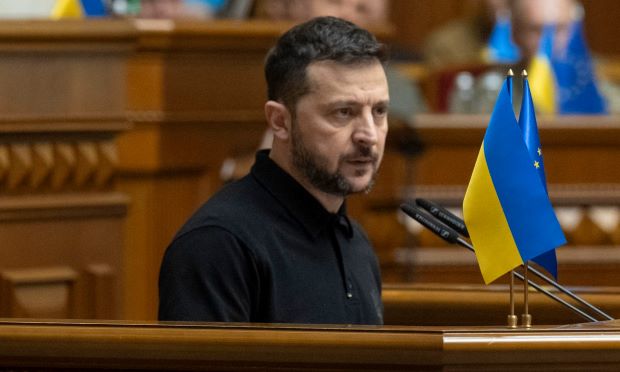Zelenskyy pitches his ‘victory plan’ to Ukrainian lawmakers
By Constant Méheut
KYIV — President Volodymyr Zelenskyy of Ukraine made a rare appearance in parliament on Wednesday (16), pitching a plan to lawmakers that he said could end the war by next year but which has drawn a lukewarm response from allies.
Some broad outlines for the plan — which Zelenskyy referred to as a “peace through strength” strategy — had been shared in recent weeks. The president’s address to parliament, his first so far this year, was seen by many Ukrainians as an attempt to sell his message at home and reassure a nation where war fatigue is on the rise amid steady Russian advances.
The proposal, which Zelenskyy has called a “victory plan”, aims to strengthen Ukraine’s position enough on the battlefield to force Russia to negotiate an end to the war. Much of that would hinge on increased Western support.
“If we start moving forward with this victory plan now, we may be able to end the war no later than next year,” Zelenskyy said in his speech Wednesday, which was also broadcast on television.
“This plan can be implemented,” he added. “It depends on our partners. I emphasize: on partners.”
But whether Ukraine’s allies will endorse the plan remains to be seen. Zelenskyy recently visited Washington and European capitals to brief Ukraine’s allies on the strategy, and the responses have been limited. Gen. CQ Brown, the chair of the Joint Chiefs of Staff, raised questions about the plan, noting that it repeats some of Ukraine’s earlier calls for increased military aid.
NATO defence ministers will discuss Zelenskyy’s plan during two days of talks that begin Thursday (17), the military alliance’s new secretary-general, Mark Rutte, said at a news conference Wednesday. “It will no doubt be on the table,” he said.
Rutte would not comment on the specifics of the proposal, or on Zelenskyy’s desire to be offered a formal invitation to join NATO, even if the conflict with Russia makes that currently impractical. He said Ukraine would one day join the alliance, but that the defence ministers would concentrate on providing up to 40 billion euros ($43.5 billion) in military support for Ukraine as promised at their last summit meeting.
Given the context, experts said, Zelenskyy’s speech seemed primarily aimed at reassuring and rallying support from the Ukrainian public around the idea that Ukraine can turn the tide on the battlefield after steadily losing ground to Russian troops this year. In recent weeks, Russian forces have been closing in on the northeastern city of Kupiansk, prompting Ukrainian authorities there to order a mandatory evacuation Tuesday (15).
“It’s necessary to boost the Ukrainian morale today,” Olexiy Haran, a professor of comparative politics at the National University of Kyiv — Mohyla Academy, said in an interview. “This speech is meant to send a political and psychological message to the Ukrainians.”
More than two years into the fighting and faced with steady Russian advances, war fatigue in Ukraine has risen. And sentiment in some cases has shifted from an unwavering resolve for total and outright victory to a more conciliatory stance.
A study released in August by the Kyiv International Institute of Sociology found that 57% of Ukrainians believe that Ukraine should engage in peace negotiations with Moscow.
Zelenskyy cast his plan as a “bridge” to a future peace settlement, saying Wednesday that the goal was to make it impossible for Russia “to continue the war,” so that Moscow felt pressured to come to the negotiating table.
The plan would require allies to extend an invitation to join NATO, lift the restrictions that bar Ukraine from using Western-provided weapons to strike inside Russia, and establish joint weapons production with Ukraine — all asks previously made by Zelenskyy’s government.
On Wednesday, the Ukrainian leader also said he wanted Ukraine’s neighbours to help shoot down Russian missiles and drones from their own territory, an idea that some allies have rejected in the past.
He framed the plan as mutually beneficial for Ukraine and the allies upon whose backing it would require. He noted that Ukraine had rich metal resources that its partners could use and suggested that Ukraine’s military could play a crucial role in protecting the West from further Russian aggression.
The lawmakers, government ministers and military leaders in attendance gave Zelenskyy a standing ovation when he emphasized that “trading Ukraine’s territory or sovereignty” was not part of the plan.
But opposition lawmakers were quick to express scepticism after the address. Oleksiy Honcharenko, a member of European Solidarity, the party of Zelenskyy’s chief rival, called the plan “very unrealistic.” He noted that it depended heavily on Western assistance yet did not outline what Ukraine could do on its own to improve the situation.
“According to the plan, it seems that someone has to do everything for us,” Honcharenko wrote on social media.
Some Kyiv residents were similarly unconvinced.
“The victory plan sounds great. Very glossy. But whether anyone will actually do something and how Russia will react — it’s unclear,” said Anton Sokol, 25, who was reading about the speech on his phone.
“It sounds great, but also unrealistic,” Sokol added.
Yehor Kuryschenko, 28, said the plan sounded more like a collated list of demands for Ukraine’s partners than a strategy to win the war.
“There’s nothing fundamentally new,” he said. “It’s just putting everything into one request with an emphasis on swift and decisive action.”
-New York Times



Comments are closed, but trackbacks and pingbacks are open.